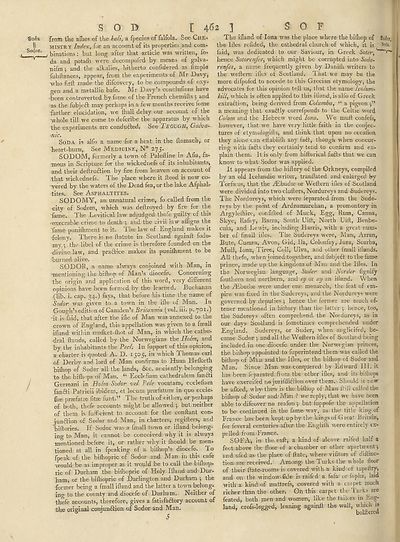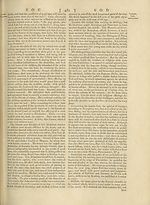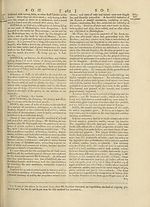Encyclopaedia Britannica, or, a Dictionary of arts, sciences, and miscellaneous literature : enlarged and improved. Illustrated with nearly six hundred engravings > Volume 19, Scripture-SUG
(508) Page 462
Download files
Complete book:
Individual page:
Thumbnail gallery: Grid view | List view

Sods,
II
Sodor.
SOD
from the allies of the huli, a Ipecies of falfola.
[ 462
^ See Che¬
mistry Index, for an account of its properties and com-
, binations: but long after that article was written, lb-
da and potafn were decompoled by means of galva-
nifm; and the alkalies, hitherto confidered as limple
fubltances, appear, from the experiments of Mr .Davy,
who firll made the difcovery, to be compounds of oxy¬
gen and a metallic bafe. Mr Davy’s conclufions have
•been controverted by feme of the French chemifts } and
as the fubjeft may perhaps in a few months receive feme
farther elucidation, we lhall delay our account of the
whole till we come to deferibe the apparatus by which
the experiments are conducted. See 1 ROUGH, Garoa-.
nic.
Soda is alfo a name for a heat in the Itomach, or
heart-burn, See Medicine, N° 275. _
SODOM, formerly a town of Palelline in Alia, fa¬
mous in Scripture for the wickednefs of its inhabitants,
and their deftruftion by fire from heaven on account of
that wickednefs. The place where it Hood is now co¬
vered by the waters of the Dead fea, or the lake Afphal-
tites. See Asphaltites.
SODOMY, an unnatural crime, fo called from the
city of Sodom, which was dellroyed by fire for the
fame. The Levitical law adjudged thofe guilty of this
execrable crime to death •, and the civil law affigns the
fame punilhment to it. 1 he law of Dngland makes it
felony. There is no llatute in Scotland again!! fodo-
my ; the libel of the crime is therefore founded on the
divine law, and practice makes its punilhment to be
burned alive.
SODOR, a name always conjoined with Man, in
‘mentioning the bilhop of Man’s diocefe. Concerning
the origin and application of this word, very difierent
opinions have been formed by the learned. Buchanan
(lib. i. cap. 34.) fays, that before his time the name of
Sodor was given to a town in the ille of Man. In
Gough’s edition of Camden’s Britanmu (vol. iii. p. 7OI0
-it is (aid, that after the ille of Man was annexed to the
crown of England, this appellation was given to a fmall
illand within mulket-fhot of Man, in which the cathe¬
dral Hands, called by the Norwegians the Holm, and
by the inhabitants the Peel. In fupport of this opinion,
a charter is quoted A. D. 1505, in which Thomas earl
of Derby and lord of Man confirms to Huan Heflceth
bilhop of Sodor all the lands, &c. anciently belonging
to the bifhops of Man. “ Ecclefiam cathedralem fan ft i
Germam in Holm Sodor vel Vele vocataro, ecclefiam
fanfti Patricii ibidem, et locum preefatum in quo eccle-
fue prajfata} litre funt.” The truth of either, or perhaps
of both, thefe accounts might be allowed ; but neither
of them is fuflfierent to account, for the conitant con-
junftion of Sodor and Man, in charters, regifters, and
hiftories. If Sodor was a fmall town or illand belong¬
ing to Man, it cannot be conceived why it is always
mentioned before it, or rather why it Ihould be men¬
tioned at all in fpeaking of a bilhop’s diocefe. Io
fpeak of the bilhopric of Sodor and Man in this cafe
would be as improper as it would be to call the bifiwp-
ric of Durham the bilhopric of Holy Ifland and Dur¬
ham, or the bilhopric of Darlington and Durham •, the
former being a fmall ifiand and the latter a town belong¬
ing to the county and diocefe of Durham. Neither of
thefe accounts, therefore, gives a fatisfaftory account of
the original conjunftion of Sodor and Man.
c
] S O F
The illand of Iona was the place where the bilhop of
the Hies refided, the cathedral church of which, it is
laid, was dedicated to our Saviour, in Greek Sotei',
hence Sotorcnfes, which might be corrupted into Sodo-
renfes, a name frequently given by Daniih writers to
the weftern illes of Scotland. That we may be the
more difpofed to accede to this Grecian etymology, the
advocates for this opinion tell us, that the name Icolum-
kill, which is often applied to this illand, is alio of Greek
extraction, being derived from Columba, “ a pigeon j”
a meaning that exaftly correfponds to the Celtic word
Colum and the Hebrew word Iona. Me mult confefs,
however, that we have very little faith in the conjec¬
tures of etymologiits, and think that upon no occalion
they alone can eltabiidi any faft, though when concur¬
ring with fafts they certainly tend to confirm and ex¬
plain them. It is only from hiftorical fafts that we can
know to what Sodor was applied.
It appears from the hillory of the Orkneys, compiled
by an old Icelandic writer, tranllated and enlarged by
Torfmus, that the Aibudm or Weltern Hies of Scotland
were divided into two clutters, Nordureys and Sudereys.
The Nordureys, which were leparated from the Sude¬
reys by the point of Ardnamurchan, a promontory in
Argylethire, eonfifted of Muck, Egg, Rum, Canna,
Skye, Rafay, Barra, South Uilt, North Uift, Benbe-
cula, and Lewis, including Harris, with a great num¬
ber of 1'mall illes. The Sudereys were, Man, Arran,
Bute, Cumra, Avon, Gid, 11a, Colonfay, Jura, Scarba,
Mull, Iona, Three, Coll, Ulva, and other Imall iftands.
All thefe, when joined together, and fubjeft to the lame
prince, made up the kingdom of Man and the Illes. In
the Norwegian language, Slider and Norder fignify
fouthern ami northern, and ey or ay an illand. When
the iEbudae were under one monarch, the feat of em¬
pire was fixed in the Sudereys, and the Nordureys were
governed by deputies j hence the former are much of-
tener mentioned in hiitory than the latter ; hence, too,
the Sudereys often comprehend the Nordureys, as in
our days Scotland is lometimes comprehended under
England. Sudereys, or Sudor, when anglicifed, be¬
came Sodor ; and all the Weftern ides of Scotland being
included in one diocefe under the Norwegian princes,
the bithop appointed to fuperintend them was called the
bilhop of Man and the Illes, or the billiop of Sodor and
Man. Since Man was conquered by Edward 111. it
has been leparated from the other illes, and its bilhops
have exercifed no juriidiftion over them. Should it now
be alked, why then is the biihop of Man Hill called the
bilhop of Sodor and Man ? we reply, that we have been
able to difeover no re a fanbut {up pole the appellation
to be continued in the fame way, as the title king of
France has been kept up by the kings of Great Britain,
for feveral centuries after the Engliih were entirely ex¬
pelled from‘France.
SOFA, in the eaft, a kind of alcove raifed half a
foot above the floor of a chamber or other apartment j
and uftd as the place of ftate, where vilitors of diftinc-
tion are received. Among the Turks the whole floor
of their Hate-rooms is covered with a kind of tape it ry,
and on the wmdow-fide is raifed a fofa orfopha, laid
with a kind of mattrefs, covered with a carpet much
richer than the other. Oft this carpet the i urks are
feated, both men and women, like the tailors in Eng¬
land, crofs-legged, leaning again!! the wall, which is
bolllered
II
Sodor.
SOD
from the allies of the huli, a Ipecies of falfola.
[ 462
^ See Che¬
mistry Index, for an account of its properties and com-
, binations: but long after that article was written, lb-
da and potafn were decompoled by means of galva-
nifm; and the alkalies, hitherto confidered as limple
fubltances, appear, from the experiments of Mr .Davy,
who firll made the difcovery, to be compounds of oxy¬
gen and a metallic bafe. Mr Davy’s conclufions have
•been controverted by feme of the French chemifts } and
as the fubjeft may perhaps in a few months receive feme
farther elucidation, we lhall delay our account of the
whole till we come to deferibe the apparatus by which
the experiments are conducted. See 1 ROUGH, Garoa-.
nic.
Soda is alfo a name for a heat in the Itomach, or
heart-burn, See Medicine, N° 275. _
SODOM, formerly a town of Palelline in Alia, fa¬
mous in Scripture for the wickednefs of its inhabitants,
and their deftruftion by fire from heaven on account of
that wickednefs. The place where it Hood is now co¬
vered by the waters of the Dead fea, or the lake Afphal-
tites. See Asphaltites.
SODOMY, an unnatural crime, fo called from the
city of Sodom, which was dellroyed by fire for the
fame. The Levitical law adjudged thofe guilty of this
execrable crime to death •, and the civil law affigns the
fame punilhment to it. 1 he law of Dngland makes it
felony. There is no llatute in Scotland again!! fodo-
my ; the libel of the crime is therefore founded on the
divine law, and practice makes its punilhment to be
burned alive.
SODOR, a name always conjoined with Man, in
‘mentioning the bilhop of Man’s diocefe. Concerning
the origin and application of this word, very difierent
opinions have been formed by the learned. Buchanan
(lib. i. cap. 34.) fays, that before his time the name of
Sodor was given to a town in the ille of Man. In
Gough’s edition of Camden’s Britanmu (vol. iii. p. 7OI0
-it is (aid, that after the ille of Man was annexed to the
crown of England, this appellation was given to a fmall
illand within mulket-fhot of Man, in which the cathe¬
dral Hands, called by the Norwegians the Holm, and
by the inhabitants the Peel. In fupport of this opinion,
a charter is quoted A. D. 1505, in which Thomas earl
of Derby and lord of Man confirms to Huan Heflceth
bilhop of Sodor all the lands, &c. anciently belonging
to the bifhops of Man. “ Ecclefiam cathedralem fan ft i
Germam in Holm Sodor vel Vele vocataro, ecclefiam
fanfti Patricii ibidem, et locum preefatum in quo eccle-
fue prajfata} litre funt.” The truth of either, or perhaps
of both, thefe accounts might be allowed ; but neither
of them is fuflfierent to account, for the conitant con-
junftion of Sodor and Man, in charters, regifters, and
hiftories. If Sodor was a fmall town or illand belong¬
ing to Man, it cannot be conceived why it is always
mentioned before it, or rather why it Ihould be men¬
tioned at all in fpeaking of a bilhop’s diocefe. Io
fpeak of the bilhopric of Sodor and Man in this cafe
would be as improper as it would be to call the bifiwp-
ric of Durham the bilhopric of Holy Ifland and Dur¬
ham, or the bilhopric of Darlington and Durham •, the
former being a fmall ifiand and the latter a town belong¬
ing to the county and diocefe of Durham. Neither of
thefe accounts, therefore, gives a fatisfaftory account of
the original conjunftion of Sodor and Man.
c
] S O F
The illand of Iona was the place where the bilhop of
the Hies refided, the cathedral church of which, it is
laid, was dedicated to our Saviour, in Greek Sotei',
hence Sotorcnfes, which might be corrupted into Sodo-
renfes, a name frequently given by Daniih writers to
the weftern illes of Scotland. That we may be the
more difpofed to accede to this Grecian etymology, the
advocates for this opinion tell us, that the name Icolum-
kill, which is often applied to this illand, is alio of Greek
extraction, being derived from Columba, “ a pigeon j”
a meaning that exaftly correfponds to the Celtic word
Colum and the Hebrew word Iona. Me mult confefs,
however, that we have very little faith in the conjec¬
tures of etymologiits, and think that upon no occalion
they alone can eltabiidi any faft, though when concur¬
ring with fafts they certainly tend to confirm and ex¬
plain them. It is only from hiftorical fafts that we can
know to what Sodor was applied.
It appears from the hillory of the Orkneys, compiled
by an old Icelandic writer, tranllated and enlarged by
Torfmus, that the Aibudm or Weltern Hies of Scotland
were divided into two clutters, Nordureys and Sudereys.
The Nordureys, which were leparated from the Sude¬
reys by the point of Ardnamurchan, a promontory in
Argylethire, eonfifted of Muck, Egg, Rum, Canna,
Skye, Rafay, Barra, South Uilt, North Uift, Benbe-
cula, and Lewis, including Harris, with a great num¬
ber of 1'mall illes. The Sudereys were, Man, Arran,
Bute, Cumra, Avon, Gid, 11a, Colonfay, Jura, Scarba,
Mull, Iona, Three, Coll, Ulva, and other Imall iftands.
All thefe, when joined together, and fubjeft to the lame
prince, made up the kingdom of Man and the Illes. In
the Norwegian language, Slider and Norder fignify
fouthern ami northern, and ey or ay an illand. When
the iEbudae were under one monarch, the feat of em¬
pire was fixed in the Sudereys, and the Nordureys were
governed by deputies j hence the former are much of-
tener mentioned in hiitory than the latter ; hence, too,
the Sudereys often comprehend the Nordureys, as in
our days Scotland is lometimes comprehended under
England. Sudereys, or Sudor, when anglicifed, be¬
came Sodor ; and all the Weftern ides of Scotland being
included in one diocefe under the Norwegian princes,
the bithop appointed to fuperintend them was called the
bilhop of Man and the Illes, or the billiop of Sodor and
Man. Since Man was conquered by Edward 111. it
has been leparated from the other illes, and its bilhops
have exercifed no juriidiftion over them. Should it now
be alked, why then is the biihop of Man Hill called the
bilhop of Sodor and Man ? we reply, that we have been
able to difeover no re a fanbut {up pole the appellation
to be continued in the fame way, as the title king of
France has been kept up by the kings of Great Britain,
for feveral centuries after the Engliih were entirely ex¬
pelled from‘France.
SOFA, in the eaft, a kind of alcove raifed half a
foot above the floor of a chamber or other apartment j
and uftd as the place of ftate, where vilitors of diftinc-
tion are received. Among the Turks the whole floor
of their Hate-rooms is covered with a kind of tape it ry,
and on the wmdow-fide is raifed a fofa orfopha, laid
with a kind of mattrefs, covered with a carpet much
richer than the other. Oft this carpet the i urks are
feated, both men and women, like the tailors in Eng¬
land, crofs-legged, leaning again!! the wall, which is
bolllered
Set display mode to:
![]() Universal Viewer |
Universal Viewer | ![]() Mirador |
Large image | Transcription
Mirador |
Large image | Transcription
Images and transcriptions on this page, including medium image downloads, may be used under the Creative Commons Attribution 4.0 International Licence unless otherwise stated. ![]()
| Permanent URL | https://digital.nls.uk/192701886 |
|---|
| Attribution and copyright: |
|
|---|
| Description | Ten editions of 'Encyclopaedia Britannica', issued from 1768-1903, in 231 volumes. Originally issued in 100 weekly parts (3 volumes) between 1768 and 1771 by publishers: Colin Macfarquhar and Andrew Bell (Edinburgh); editor: William Smellie: engraver: Andrew Bell. Expanded editions in the 19th century featured more volumes and contributions from leading experts in their fields. Managed and published in Edinburgh up to the 9th edition (25 volumes, from 1875-1889); the 10th edition (1902-1903) re-issued the 9th edition, with 11 supplementary volumes. |
|---|---|
| Additional NLS resources: |
|

